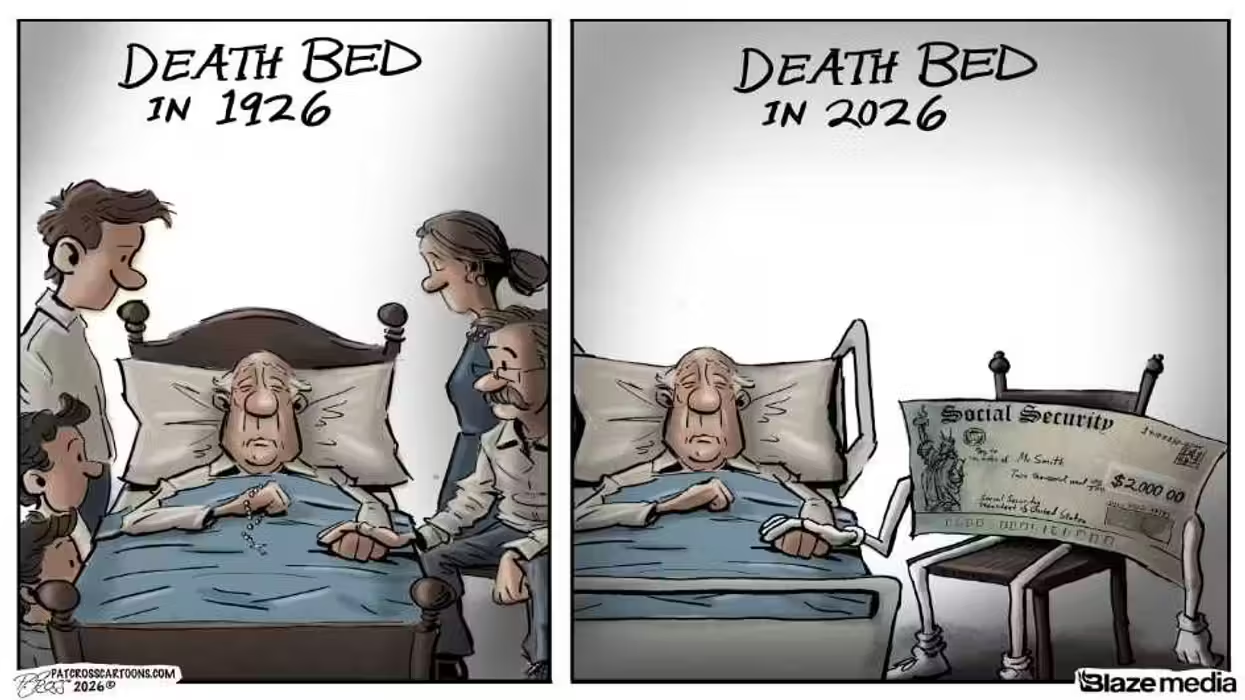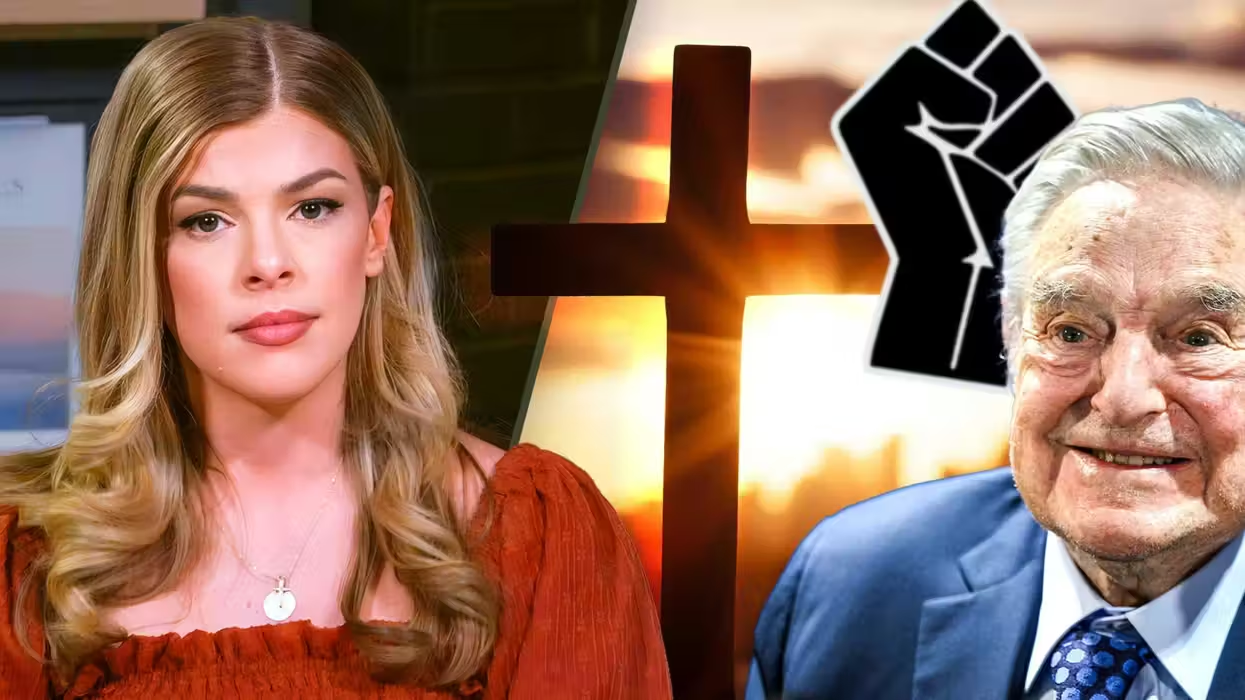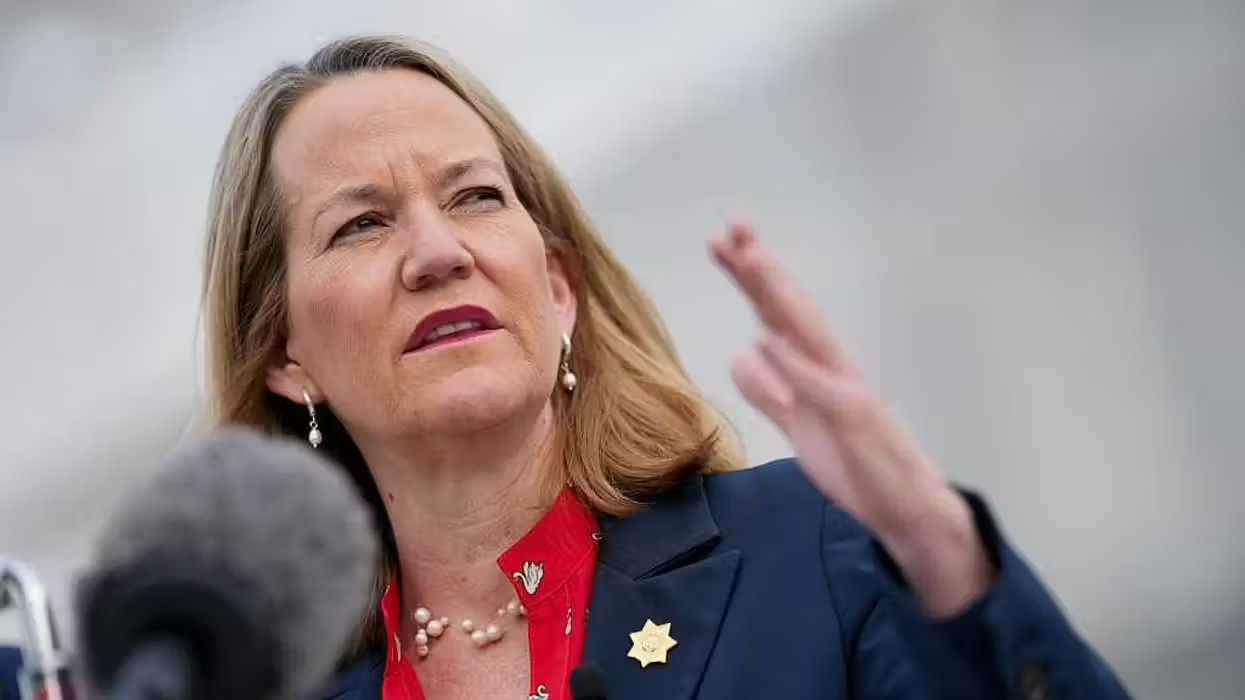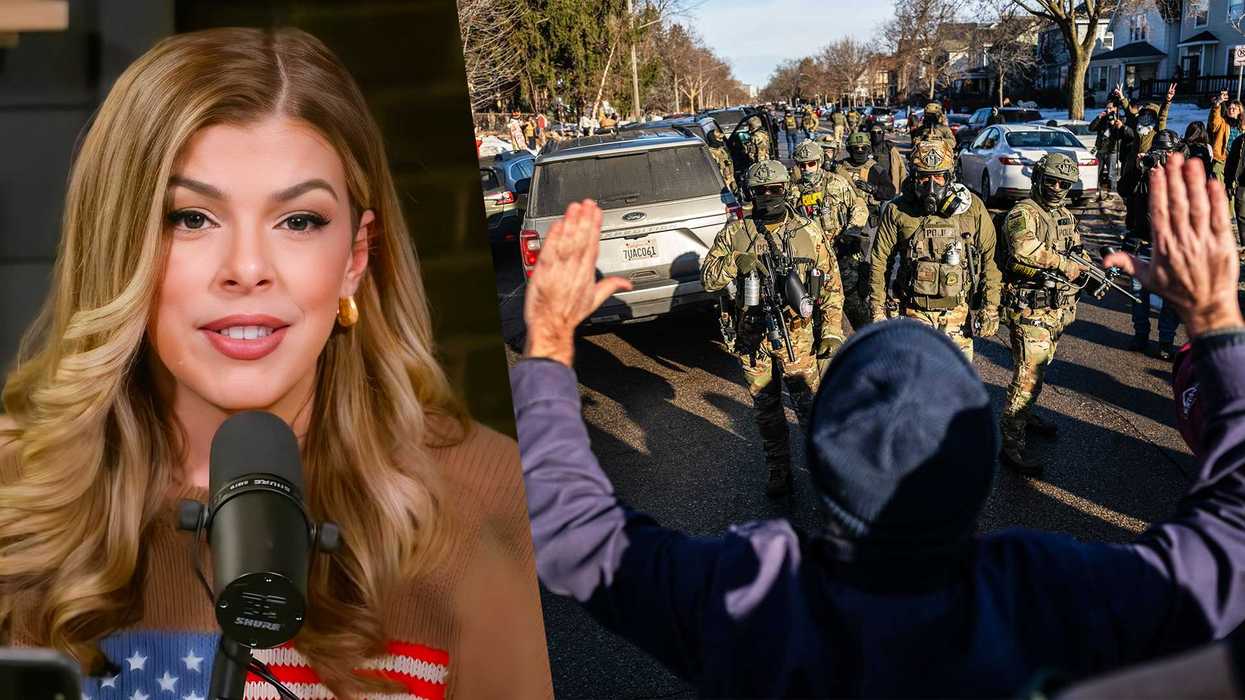
© 2026 Blaze Media LLC. All rights reserved.
It could be argued that if then-presidential candidate John McCain had truly assailed his rival Barack Obama over his exhaustive collection of dubious dealings and less-than-scrupulous friends (think: Davis, Khalidi, Pflager, Wright, Ayers, Rezko, Said, etc.), he just might have taken the election. Instead, McCain chose to "keep above the fray" -- although few are clear as to why bringing up substantive and valid concerns over the first-term senator's past constituted otherwise to the Maverick-camp. Now, President Obama is three years into his first term as president, and his campaign for reelection has officially kicked off with a record-setting $15 million celebrity-fundraiser hosted by devotee George Clooney.
If the president's true history continues to be replaced by the alternate narrative he has constructed for himself; if his fact, rather than fiction-based life is swept under the carpet again, he will likely retake the Oval Office.
With this in mind, Glenn Beck dedicated his Thursday evening broadcast to reviewing the staggering array of inconsistencies, embellishments and "manufactured lies" perpetuated by the president over the course of his political career.
"His life is complete fiction," Beck said. Let's review the non-fiction version before we go any further:
In Part II of this report, we will briefly profile some of the president's more questionable deeds, but in order to provide proper context, consider the following cast of characters who helped to shape Obama's life and mindset.
Dreams from an anti-colonialist father
It is difficult to understand what truly moves the president without understanding who his father was. In his book, "The Roots of Obama's Rage," Dinesh D'Souza described in painstaking detail, an unsavory character who womanized, abused, drank excessively (killing a man in one drunk-driving incident, losing both of his legs in another, and later killing himself in yet another), abandoned his eight children at various points in their lives, married thrice without ever having divorced his first wife, and advocated taxing income at a 100% rate. Unbelievably, the man described is not a work of fiction. He was President Barack Obama's father.
In his book, "The Roots of Obama's Rage," Dinesh D'Souza described in painstaking detail, an unsavory character who womanized, abused, drank excessively (killing a man in one drunk-driving incident, losing both of his legs in another, and later killing himself in yet another), abandoned his eight children at various points in their lives, married thrice without ever having divorced his first wife, and advocated taxing income at a 100% rate. Unbelievably, the man described is not a work of fiction. He was President Barack Obama's father.
Barak Obama Sr. (spelled without the "c") was a Harvard economics graduate student from Kenya and despite the president's insistance that his paternal lineage comprised humble stock, Barak Sr. was actually from a prominent and wealthy farming family. His father, Hussein Onyango Obama, was also an observant Muslim who chose the Arabic name "Barak" because it means "blessed."
In an article written for the East Africa Journal in 1965, "Problems Facing Our Socialism," Barak Sr. explained that in the wake of colonialism, socialism was necessary to ensure national autonomy for Kenya. "The question," he wrote, "is how are we going to remove the disparities in our country, such as the concentration of economic power in Asian and European hands . . .?" [emphasis added]
 "We need to eliminate power structures that have been built through excessive accumulation so that not only a few individuals shall control a vast magnitude of resources as is the case now."
"We need to eliminate power structures that have been built through excessive accumulation so that not only a few individuals shall control a vast magnitude of resources as is the case now."
Sound familiar?
Obama Sr. went on to insist that "theoretically there is nothing that can stop the government from taxing 100 percent of income so long as the people get benefits from the government commensurate with their income which is taxed."
D'Souza explains the significance:
Absurd as it seems, the idea of 100 percent taxation has its peculiar logic. It is based on the anti-colonial assumption that the rich have become rich by exploiting and plundering the poor; therefore, whatever the rich have is undeserved and may be legitimately seized.
Recall now that the president's book is titled Dreams From My Father, not Dreams Of My Father. In the memoir, Obama described longing to emulate his senior, writing, "it was into my father's image, the black man, son of Africa, that I'd packed all the attributes I sought in myself."
D'Souza also noted those close to Obama Jr., including his grandmother Sarah Obama, agreed with the passage. She told Newsweek, "I look at him and I see all the same things -- he has taken everything from his father . . . this son is realizing everything the father wanted."
While some might argue that it is implausible to think the president would seek to live-out the dreams of a deeply flawed man who callously abandoned him, human nature and psychology dictates otherwise. Even into adulthood, we often seek the approval of our parents -- sometimes even the ones that withhold love -- because theirs is the affection we most desire gaining. True, one cannot hold the president responsible for the sins of his father, but that does not mean he doesn't still seek his approval.
All the while, Obama dimisses the influence his father had on him. Yes, it is possible that the president is so repulsed by his father's life that he would reject everything the man ever stood for, but then why would his own memoir read as a tribute to the dreams his father never had the opportunity to realize?
"We're not in Kansas anymore": Stanley Ann Dunham
Not a tremendous amount his known about the woman with an unusual first name who married Barak Obama Sr., some say, to spite her racist father. But what we can glean from various accounts provides relevant insight into Obama's upbringing and influences.
Barak Obama Sr., some say, to spite her racist father. But what we can glean from various accounts provides relevant insight into Obama's upbringing and influences.
After moving several times as a child, Stanley Ann Dunham eventually settled in progressive Mercer Island, just outside Seattle. She attended Mercer Island High School, a place that distinguished itself by having a former Communist Party member serve as chairman of the island's school board. But that is not where the leftist connections ended.
According to the American Thinker, Dunham attended her high school's "anarchy alley," where philosophy courses on Karl Marx were offered. The academics leading the effort were Val Foubert and Jim Wichterman, both reportedly of the Marxist "Frankfurt School" and who taught "critical theory" to students that included curriculum on the rejection of societal norms, and attacks on Christianity and the traditional family. Dunham's peers considered her an "inquiring mind" and it is said that she grew to become part of the left's intelligentsia.
 After her family moved to Hawaii, Dunham attended the University of Hawaii at Manoa where she studied anthropology. It was in her Russian language class that she met the future president's father, who would later leave Dunham and their new child, Barack Jr. to attend Harvard. Eventually the two divorced (though some claim they were never married in the first place) and she went on to marry Indonesian Lolo Soetoro, who worked as a government relations executive for an Oil company. While Soetoro was a Muslim, accounts differ as to the level of his observance. In 1967 the family moved to Jakarta, Indonesia. Obama's memoir paints Soetoro as an even-tempered man who became increasingly interested in Western culture while Dunham became increasingly interested in Indonesian and other world-cultures. Inevitably a rift was formed.
After her family moved to Hawaii, Dunham attended the University of Hawaii at Manoa where she studied anthropology. It was in her Russian language class that she met the future president's father, who would later leave Dunham and their new child, Barack Jr. to attend Harvard. Eventually the two divorced (though some claim they were never married in the first place) and she went on to marry Indonesian Lolo Soetoro, who worked as a government relations executive for an Oil company. While Soetoro was a Muslim, accounts differ as to the level of his observance. In 1967 the family moved to Jakarta, Indonesia. Obama's memoir paints Soetoro as an even-tempered man who became increasingly interested in Western culture while Dunham became increasingly interested in Indonesian and other world-cultures. Inevitably a rift was formed.
According to Dr. Rich Swier, Dunham moved between Indonesia and Hawaii twice more before traveling the world to "pursue a career in rural development that took her to her Ghana, India, Thailand, Indonesia, Nepal and Bangladesh." She also traveled to China and Pakistan and by 1992 earned her Ph.D. in anthropology from the University of Hawaii. Her 1000-plus page dissertation, according to Swier was titled: "Peasant blacksmithing in Indonesia: Surviving and Thriving Against All Odds."
What perhaps bears mention is that President Obama has portrayed his mother as a simple girl from Kansas when she was in fact anything but. He has also credited her with providing him with his political world view.
Mentored by a Communist
After Barack Jr.'s family re-relocated to Hawaii, he found another mentor. In his book "Dreams From My Father," Obama often and affectionately mentioned his "dashiki-wearing" role model from whom he sought both career and personal advice. While it is clear this father figure played a pivotal role in the young Obama's life, the mystery-man is only ever referred to by his first name: "Frank." Given the history, most believe the person in question is none other than the late Frank Marshall Davis -- a man publicly identified as a member of the Communist Party USA (CPUSA).
My Father," Obama often and affectionately mentioned his "dashiki-wearing" role model from whom he sought both career and personal advice. While it is clear this father figure played a pivotal role in the young Obama's life, the mystery-man is only ever referred to by his first name: "Frank." Given the history, most believe the person in question is none other than the late Frank Marshall Davis -- a man publicly identified as a member of the Communist Party USA (CPUSA).
Recalling his friend, Obama wrote: "It made me smile, thinking back on Frank and his old Black Power, dashiki self. In some ways he was as incurable as my mother, as certain in his faith, living in the same sixties time warp that Hawaii had created." But by that point in time, Frank was far from the harmless throw-back characature Obama painted him to be -- that is of course assuming his last name was Davis. National Review's Paul Kengor revealed that after moving to Hawaii Davis launched a Communist publication espousing the virtues of the Soviet Union. Kengor wrote:
Davis served as an editor and writer for a Communist-line publication, the Chicago Star, in the 1930s. I next learned that the Midwest native had flown thousands of miles away to Hawaii to take up permanent residence, just when American Communists were looking to launch a publication there, namely the Honolulu Record. Subsequently, Davis wrote a weekly column for that publication.
Kengor went on to reveal that with the determined help of research assistants, he obtained Davis’ weekly column, “Frank-ly Speaking” and that its contents mirrored perfectly "Soviet propaganda."
All the while Obama has denied his Frank is the same Frank.
A Christian of the Black Liberation variety
 After his 1960s-style awakening with Frank, another influential figure found his way into Obama's life. In fact, Reverend Jeremiah Wright is the man credited with having led the community organizer to Christianity. A member of Wright's Trinity United Church in Chicago's South Side for 20 years, so influenced by the controversial pastor was Obama, that he even named his other book, "The Audacity of Hope," after one of the reverend's sermons.
After his 1960s-style awakening with Frank, another influential figure found his way into Obama's life. In fact, Reverend Jeremiah Wright is the man credited with having led the community organizer to Christianity. A member of Wright's Trinity United Church in Chicago's South Side for 20 years, so influenced by the controversial pastor was Obama, that he even named his other book, "The Audacity of Hope," after one of the reverend's sermons.
Wright is of course best known for espousing anti-Semitic and anti-Western sentiment, once declaring that America's "chickens had come home to roost" in the wake of the September 11 attacks. To Wright, the U.S. had brought the worst terrorist attack in history upon itself by perpetrating crimes against humanity across the world.
"We bombed Hiroshima, we bombed Nagasaki, and we nuked far more than the thousands in New York and the Pentagon, and we never batted an eye," Wright blasted. "We have supported state terrorism against the Palestinians and black South Africans, and now we are indignant because the stuff we have done overseas is now brought right back to our own front yards."
Wright practices and preaches a form of Christian ideology rooted in Marxism dubbed "Black Liberation Theology," which operates with the mindset that members of the black community are still subjugated by white, racist oppressors. Those "oppressors" can range from a single individual to a head of state or even an entire government or geographical region (i.e.: "The West").
With a victimhood mentality deeply entrenched in the collective mindset of the movement, Black Liberation Theology preys upon and seeks to reignite past resentments within the black community, thus fomenting a racism of its very own. While this tactic is certainly anathema to tenets of Christian "brotherly love," it does not seem to stop Wright from fanning the flames of hatred. In fact, Black Liberation Theology condones violence so long as it is wielded by "the oppressed" in their "struggle to remove inequities" (whatever those might be).
In an analysis of the theology, Ron Rhodes writes: "The removal of inequities is believed to result in the removal of the occasion of sin [i.e., the oppressor] as well."
In other words, assaulting, even killing your perceived foe is considered a good deed by Black Liberation standards.
Despite this, President Obama sat in the pews of Wright's church for 20 years while the incensed
 Jeremiah Wright and Bill Ayers
Jeremiah Wright and Bill Ayers
preacher spouted a steady stream of anti-Semitism and 9/11 conspiracy theories, proclaimed the HIV virus was an invention of the U.S. government to infect and ultimately annihilate the black populace, vehemently opposed interracial marriage and post-segregation assimilation, and praised the dictatorships of Mahmoud Ahmadinejad and Hugo Chavez. Wright is also friendly with fellow-Chicagoan and radical Louis Farrakhan.
All the while, Obama claimed ignorance, suggesting he was absent the days Wright delivered his more piquant declarations and dismissed his spiritual adviser of 20 years as a kind of "crazy uncle" that you may love, but take with a grain of salt. Wright must have been none-too-pleased.
Launching his career with the help of Marxists and domestic terrorists
 Another point of contention has been President Obama's ties to notorious domestic terrorist Bill Ayers, who many believe was instrumental in launching Obama's political career. Leader of the radical "Weather Underground," Ayers has railed against capitalism and the "establishment" for nearly half-a-century, often resorting to physical violence to carry out his goals. Aside from organizing typical protest demonstrations (some of which turned riotous), Ayers is perhaps best known for orchestrating a series of bombings: at the New York City Police Headquarters in 1970, the Capitol Building in 1971, and the Pentagon in 1972.
Another point of contention has been President Obama's ties to notorious domestic terrorist Bill Ayers, who many believe was instrumental in launching Obama's political career. Leader of the radical "Weather Underground," Ayers has railed against capitalism and the "establishment" for nearly half-a-century, often resorting to physical violence to carry out his goals. Aside from organizing typical protest demonstrations (some of which turned riotous), Ayers is perhaps best known for orchestrating a series of bombings: at the New York City Police Headquarters in 1970, the Capitol Building in 1971, and the Pentagon in 1972.
You might also recall that Ayer's "Days of Rage" demonstrations -- in which he incited aspiring revolutionaries to "kill all the rich people" including their parents -- served as inspiration for the Occupy Wall Street movement.
Where does a resume like that take you in life? The halls of academia, of course. Ayers served as a "distinguished" professor at the University of Illinois at Chicago from 1987 to 2010.
No one knows the exact origins of their relationship. Perhaps it was through Frank Marshall Davis, or Obama's parents, or the fact that he lived merely three blocks away that Obama connected with Ayers in a seemingly profound way. Whatever the case, the 1960s radical must have taken a shine to the Obama as he is credited with helping him gain admission to Harvard and, in 1995, along with his wife Bernadine Dohrn, organized meet-and-greet gatherings at his Chicago home to introduce the aspiring state-senator to their inner-circle of friends political allies (including fellow Marxists Alice Palmer and Quentin Young). Evidence also strongly suggests Obama's memoir, "Dreams From My Father," was in fact penned by Ayers.
Obama has brushed off the level of his involvement with Ayers but in his book, "Fugitive Days: Memoirs of an Anti-War-Activist," Ayers admitted the tie:
"In 2008 there was a lot of chatter on the blogosphere about my relationship with Barack Obama: we had served together on the board of a foundation, knew one another as neighbors and family friends, held an initial fundraiser at my house, where I'd made a small donation to his earliest political campaign."
It is also worth noting that Ayers' father Tom is said to have given Obama his first professional break, yet the president claims to have never met him.
All the while, the president has trivialized his relationship with Ayers, begrudgingly admitting to have attended a political event at his home, but that he had no clue of the Weather Underground nor Ayer's history as a domestic terrorist.
In part two of this special report we will review some of the president's political actions and associations that likely reflect the influences he acquired from this strange and controversial cast of characters.
Want to leave a tip?
We answer to you. Help keep our content free of advertisers and big tech censorship by leaving a tip today.
Want to join the conversation?
Already a subscriber?
more stories
Sign up for the Blaze newsletter
By signing up, you agree to our Privacy Policy and Terms of Use, and agree to receive content that may sometimes include advertisements. You may opt out at any time.
Related Content
© 2026 Blaze Media LLC. All rights reserved.
Get the stories that matter most delivered directly to your inbox.
By signing up, you agree to our Privacy Policy and Terms of Use, and agree to receive content that may sometimes include advertisements. You may opt out at any time.






